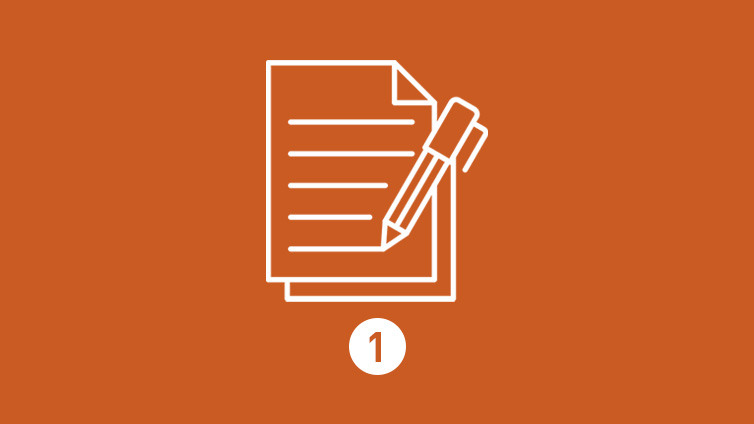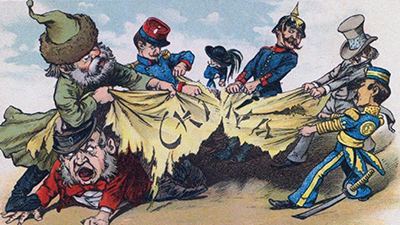Empire and Other Consequences of Industrialization
Driving Question: How were industrial empires different from earlier types of empires?
Industrialization empowered empires in the nineteenth century. New tools of warfare, production, transportation, and communication helped industrial empires spread to new places. Yet, in every region, colonized people found means to resist industrial imperialism.
Learning Objectives:
- Identify how industrialization supported imperialism and the expansion of empires.
- Evaluate how imperialism changed communities, networks, and production and distribution during the nineteenth century.
- Use close-reading skills to consider how various trends contributed to a new age of imperialism.
Vocab Terms:
- colonialism
- exploitative
- imperialism
- racism
- rebellion
- resistance
- segregation
- subject
Opener: Empire and Other Consequences of Industrialization
To teach this lesson step, refer to page 2 of the Lesson 6.1 Teaching Guide.
This blog post, “Here to be dragons: Teaching world history in maps”, is a great reminder that historical maps are not just geographic tools, but windows into the beliefs, fears, and priorities of the people who made them.
Imperialism shaped the world as it evolved during the nineteenth century. What can comparing images tell you about this big moment in history?
Looking Ahead
To teach this lesson step, refer to page 3 of the Lesson 6.1 Teaching Guide.
Our Writing Guide shares our approach to informal and formal writing, including Unit Notebooks.
Agree or disagree? Evaluate some statements before you dive into Unit 6—then see how accurate you were when you get to the end of the unit.
Expanding Empires
To teach this lesson step, refer to page 3 of the Lesson 6.1 Teaching Guide.
Looking to differentiate, modify or adapt this assignment? Check out our Differentiation Guide.
Imperialism expanded in the nineteenth century, but it looked different in different regions. This video and article will help you consider how power, resistance, and inequality shaped a new age of imperialism.
-
Guiding Questions
-
Before you watch
Preview the questions below, and then review the transcript.
While you watch
Look for answers to these questions:
- How were the empires of this period different from earlier empires?
- What is surprising about the fact that Britain, France, Germany, Japan, and the United States held empires in this period?
- What is the difference between imperialism and colonialism?
- How did global economic equality change between 1800 and 1975?
- How did the French change Hanoi, and how did the people there respond?
After you watch
Respond to this question: How is it possible for a state to be internally democratic and have an empire at the same time?
-
Guiding Questions
-
Before you read
Preview the questions below, and then skim the article. Be sure to look at the section headings and any images.
While you read
Look for answers to these questions:
- How did reformers actually drive imperialism, in some cases?
- How did imperial claims of racial superiority affect people in colonies?
- Why did industrialization help support imperialism?
- What does it mean to say that people in the colonies were “subjects”?
- How did colonial subjects respond to being treated as they were?
After you read
Respond to this question: Can you think of any ways that the impacts of industrial empires are still affecting our world today?
Framing Unit 6
To teach this lesson step, refer to page 5 of the Lesson 6.1 Teaching Guide.
This discussion on the OER Project Community forum has teachers sharing tips for drawing the frames of an empire.
Learn how to examine imperialism through the lenses of communities, networks, and production and distribution to better understand how empires shaped and disrupted the world.
-
Guiding Questions
-
Before you watch
Preview the questions below, and then review the transcript.
While you watch
Look for answers to these questions:
- How did empires contradict the trends of the political and national revolutions of the long nineteenth century?
- How did empires interact with the changes of industrialization?
- Did the reform movements of the long nineteenth century affect colonized people?
After you watch
Respond to the following question: Why do you think empires expanded during an age that also saw new ideas and revolutions championing freedom?
Closer: Empire and Other Consequences of Industrialization
To teach this lesson step, refer to page 6 of the Lesson 6.1 Teaching Guide.
Now that you know more about imperialism, take another look at the images you examined at the beginning of the lesson.
Essay Review: Organization and Language/Style
To teach this lesson step, refer to page 7 of the Lesson 6.1 Teaching Guide.
A great way to improve your writing skill is to evaluate writing samples. In this activity, you’ll evaluate your own writing or a sample essay using the Organization and Language/Style rows of the OER Project Writing Rubric.






